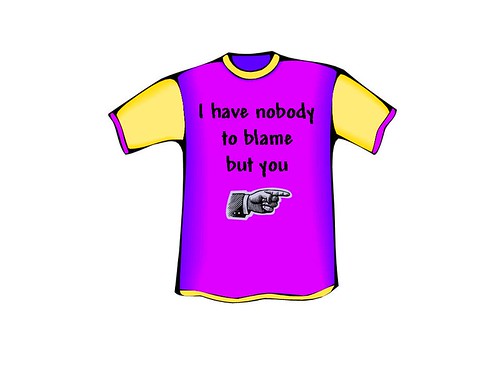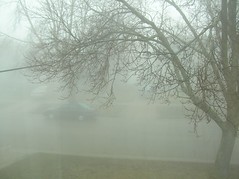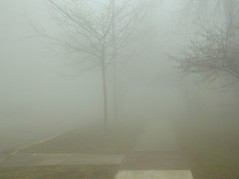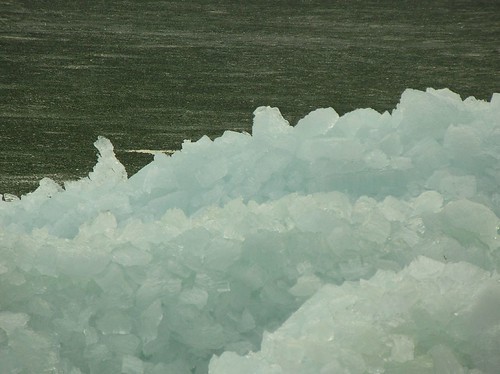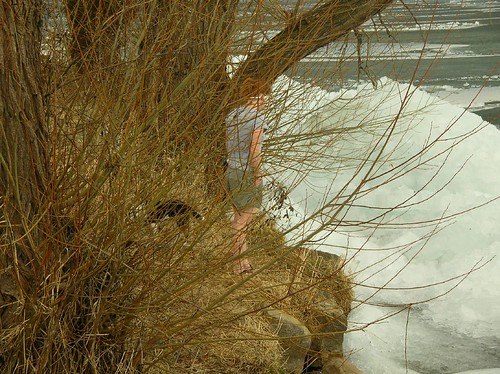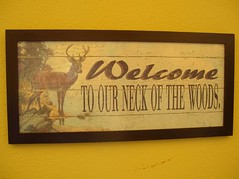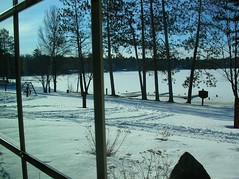Saturday, March 31, 2007
T-shirt idea
Friday, March 30, 2007
Random thought of the day: Bob Dylan
That man really knows how to force a rhyme, doesn't he?
Thursday, March 29, 2007
No hugs, no learning
A couple of years ago, I read a funny and interesting profile of Larry David in The New Yorker. Larry Charles, David's collaborator and an executive producer on Curb Your Enthusiasm, was quoted as saying that the credo in writing Curb, a beautifully edgy sit-com, is "no hugs, no learning."
This is a strong assertion of sitcom artistic integrity, on the level of Aaron Sorkin successfully fighting the networks to remove the laugh-track from his ensemble "dramedy" series Sports Night. "Hugs and learning" -- an upbeat resolution forced onto the end of every half-hour, the result of pandering to the advertizers' idea of middle-American tastes -- makes ordinary sitcoms unwatchably cloying.
And yet "no hugs, no learning" is itself a formula. They make it in work in Curb -- a show that slowly grew on me to the point where it's one of my all-time favorites. Larry David as he plays himself on the show is a walking battleground between the forces of mensch and the forces of asshole, the latter winning out more often than not. Yet you can't help but like Larry, for putting that struggle right out there. There's a meta-observation thing going on: you think, he's such a jerk, but he's making fun of himself on his own TV show for being a jerk, so he must be fundamentally a good guy.
Larry, as he plays himself in Curb, is totally (understandably) ego-melded to the Seinfeld show, his life's great achievement. He goes around introducing himself as the creator of Seinfeld, eats up stroking from Seinfeld fans, and gets wounded by people who dis Seinfeld. I like Larry so much that I'd like to say that I loved Seinfeld just to get on his good side. But I didn't.
It wasn't the "show about nothing" quality of Seinfeld that irritated the bejeezus out of me. It was the "no learning" thing. No matter what happened within a given half hour, the Seinfeld characters would learn nothing from their experiences. They never changed a bit. Every new show seemed to start from the beginning: Jerry would have a new girlfriend to break up with due to some stupid thing like a lisp or buck teeth. George would still be an idiot. Jerry and Elaine would still have a past but no future. While occasional story arcs spanned more than one half hour, most did not. The perpetually starting from scratch made me feel claustrophobic, like I was caught in the sort of scrolling, animated loop that you can see in the background of Flintstone's cartoons. Seinfeld was like Groundhog Day with no memory of what happened the day before; or like 50 First Dates without the Adam Sandler character. While "no learning" might work with complex characters like Larry in Curb, it's a different animal with the cartoonish characters of Seinfeld. That show just took a good joke -- no learning -- too far, several years too far.
My new favorite comedic show is the snappy, hip Entourage. Interestingly, Larry "No Hugs, No Learning" Charles is an executive producer on this show too. I'm working my way through past seasons and very impressed the scriptwriting, particularly by the way that the show is filled with hugs and learning without the sticky sentimentality. The episode where both the assistant and the client stick with super-agent Ari Gold (Jeremy Piven) as he crashes and burns in a dubious Jerry Macguire move is a great example.
It turns out that you can have hugs and learning and keep your edginess. Piven captures this quality every time he whips out his signature line: "let's hug it out."
This is a strong assertion of sitcom artistic integrity, on the level of Aaron Sorkin successfully fighting the networks to remove the laugh-track from his ensemble "dramedy" series Sports Night. "Hugs and learning" -- an upbeat resolution forced onto the end of every half-hour, the result of pandering to the advertizers' idea of middle-American tastes -- makes ordinary sitcoms unwatchably cloying.
And yet "no hugs, no learning" is itself a formula. They make it in work in Curb -- a show that slowly grew on me to the point where it's one of my all-time favorites. Larry David as he plays himself on the show is a walking battleground between the forces of mensch and the forces of asshole, the latter winning out more often than not. Yet you can't help but like Larry, for putting that struggle right out there. There's a meta-observation thing going on: you think, he's such a jerk, but he's making fun of himself on his own TV show for being a jerk, so he must be fundamentally a good guy.
Larry, as he plays himself in Curb, is totally (understandably) ego-melded to the Seinfeld show, his life's great achievement. He goes around introducing himself as the creator of Seinfeld, eats up stroking from Seinfeld fans, and gets wounded by people who dis Seinfeld. I like Larry so much that I'd like to say that I loved Seinfeld just to get on his good side. But I didn't.
It wasn't the "show about nothing" quality of Seinfeld that irritated the bejeezus out of me. It was the "no learning" thing. No matter what happened within a given half hour, the Seinfeld characters would learn nothing from their experiences. They never changed a bit. Every new show seemed to start from the beginning: Jerry would have a new girlfriend to break up with due to some stupid thing like a lisp or buck teeth. George would still be an idiot. Jerry and Elaine would still have a past but no future. While occasional story arcs spanned more than one half hour, most did not. The perpetually starting from scratch made me feel claustrophobic, like I was caught in the sort of scrolling, animated loop that you can see in the background of Flintstone's cartoons. Seinfeld was like Groundhog Day with no memory of what happened the day before; or like 50 First Dates without the Adam Sandler character. While "no learning" might work with complex characters like Larry in Curb, it's a different animal with the cartoonish characters of Seinfeld. That show just took a good joke -- no learning -- too far, several years too far.
My new favorite comedic show is the snappy, hip Entourage. Interestingly, Larry "No Hugs, No Learning" Charles is an executive producer on this show too. I'm working my way through past seasons and very impressed the scriptwriting, particularly by the way that the show is filled with hugs and learning without the sticky sentimentality. The episode where both the assistant and the client stick with super-agent Ari Gold (Jeremy Piven) as he crashes and burns in a dubious Jerry Macguire move is a great example.
It turns out that you can have hugs and learning and keep your edginess. Piven captures this quality every time he whips out his signature line: "let's hug it out."
Monday, March 26, 2007
I'm betting that my weather is more interesting than yours
Winter started late and ended late here in My Home Town. Yesterday was the first day of warm spring weather, and it began with dense fog. I walked down to the lake.
I couldn't see much past the edge, but the ice seemed soft and thin, and was making strange noises. It hasn't gotten below freezing for a few days now, so it seemed like a matter of time before the ice would start it's final break-up and melt-down.
The fog burned off, giving way to a sunny, beautiful spring day. I've lived in places where the weather feels like it's warm and cold at the same time -- San Francisco is notoriously this way -- because you get heated by the glaring sun while chilling breezes hit you. My Home Town wasn't quite like this today: the breezes were warm, like the scirocco. Okay, I dramatize, but there wasn't a hint of chill in the breeze.
That is, until you got near the lake. There, the breeze blowing across the still icy surface gave a sensation of artificial cooling, like stepping into the meat locker at your summer job.
At the edge of the shore, I saw this:
The breaking ice sheets were blown by the wind to the edge of the lake, where they formed piles of brick-sized ice cubes! These piles formed with just a few hours. Compare the photo of the lake, above taken that morning.
Ice or no ice, the folks of My Home Town were going to enjoy this spring day in shorts.
This morning, the lake was completely open. And with temperatures expected to hit the mid-70s today, the ice cube piles will soon be gone.
Left: yesterday. Right: today.
Sunday, March 25, 2007
Driven out of my favorite coffee shop by the barista's choice of music
Not what you want to hear Sunday morning as your brain struggles to come into focus.
The Tiger Lillies
Sort of Tom Waits meets Boy George. And they have a love child. Who forms a group to sing Brecht-Weil numbers.
The Tiger Lillies
Sort of Tom Waits meets Boy George. And they have a love child. Who forms a group to sing Brecht-Weil numbers.
Saturday, March 24, 2007
Art imitates life imitates art
[source: Franklin and Winston: An Intimate Portrait of an Epic Friendship, by Jon Meacham]
Have you ever wondered how great war leaders busy saving the world spend their occasional down time?
Steaming across the ocean to meet Roosevelt for what is now known as the Atlantic Conference in August 1941 -- the first war-time meeting between the American and British leaders to map out grand strategy -- Churchill spent an evening viewing Lady Hamilton, a recent biopic of the affair between Hamilton (Vivian Leigh) and Admiral Horatio Nelson (Laurence Olivier).
The film, of course, depicts Nelson's death at the Battle of Trafalgar, the 1805 naval engagement that dealt a fatal blow to Napolean's threatened cross-channel invasion of England. In the movie, as in the real battle, Nelson gave the famous signal to his fleet, "England expects that every man will do his duty." Nelson is wounded by a French sniper and carried below, where a midshipmen tells the dying Admiral that the English fleet has won "a victory, a great victory!"
"Thank god," Nelson replies, "I have done my duty."
Alexander Cadogan, a high British official watching the film with Churchill noted in his diary: "PM [prime minister] watching film for 5th time moved to tears."
Have you ever wondered how great war leaders busy saving the world spend their occasional down time?
Steaming across the ocean to meet Roosevelt for what is now known as the Atlantic Conference in August 1941 -- the first war-time meeting between the American and British leaders to map out grand strategy -- Churchill spent an evening viewing Lady Hamilton, a recent biopic of the affair between Hamilton (Vivian Leigh) and Admiral Horatio Nelson (Laurence Olivier).
The film, of course, depicts Nelson's death at the Battle of Trafalgar, the 1805 naval engagement that dealt a fatal blow to Napolean's threatened cross-channel invasion of England. In the movie, as in the real battle, Nelson gave the famous signal to his fleet, "England expects that every man will do his duty." Nelson is wounded by a French sniper and carried below, where a midshipmen tells the dying Admiral that the English fleet has won "a victory, a great victory!"
"Thank god," Nelson replies, "I have done my duty."
Alexander Cadogan, a high British official watching the film with Churchill noted in his diary: "PM [prime minister] watching film for 5th time moved to tears."
Friday, March 23, 2007
Existential Friday: Old Lions
I've tried my hand at a number of games and sports, and have found it to be a truth universally acknowledged that proficient players generally dislike playing with novices. This is true in chess, tennis, and golf. You might get the ace to play with you, but they're doing you a favor and it's a bit tedius for them.
A couple of years ago, I was player-manager on a recreational baseball team (baseball, not softball) comprising mostly law students. There was some talk among us about recruiting a ringer -- a law student who had actually had a cup of coffee in the show (a very brief stint in the Major Leagues). While it would have been unspeakably awesome for us recreational amateurs for him to join our team, it would have been an unbearable come-down for him, and he politely declined.
You get the idea. Competitors want the competition to be challenging.
Except in hockey.
But I'm continually astonished at how guys who played hockey at fairly high competitive levels -- high school varsity and even some college hockey -- are more than happy to come out and kick my slow, middle-aged ass around the rink. I think, "what fun could it possibly be for this 23 -year-old hot shot to steal the puck from the likes of me and blow past to make our goalie look stupid with an easy break-away goal?" And yet, there is "the Kid" coming back on a semi-regular basis to do just that, and seeming to enjoy himself. Okay, so it's not like it's Gretzky skating with our scrimmage group, but he might as well be Gretzky for all I can do to stop him.
The worst of it is that it awakens the Old Lions. The Old Lions are the 40- and 50- something one-time high school or college players who generally know how to ease up on the less experienced players and who save it for their old-guy leagues. But when the Kid joins our group, these old guys have to show that they "still have it." They can't help themselves. Suddenly, the "friendly scrimmage" facade drops away, and the game gets much, much rougher. And the inexperienced players like me are caught in this inter-generational hockey equivalent of a drive-by-shooting.
I plan to age more gracefully.
A couple of years ago, I was player-manager on a recreational baseball team (baseball, not softball) comprising mostly law students. There was some talk among us about recruiting a ringer -- a law student who had actually had a cup of coffee in the show (a very brief stint in the Major Leagues). While it would have been unspeakably awesome for us recreational amateurs for him to join our team, it would have been an unbearable come-down for him, and he politely declined.
You get the idea. Competitors want the competition to be challenging.
Except in hockey.
But I'm continually astonished at how guys who played hockey at fairly high competitive levels -- high school varsity and even some college hockey -- are more than happy to come out and kick my slow, middle-aged ass around the rink. I think, "what fun could it possibly be for this 23 -year-old hot shot to steal the puck from the likes of me and blow past to make our goalie look stupid with an easy break-away goal?" And yet, there is "the Kid" coming back on a semi-regular basis to do just that, and seeming to enjoy himself. Okay, so it's not like it's Gretzky skating with our scrimmage group, but he might as well be Gretzky for all I can do to stop him.
The worst of it is that it awakens the Old Lions. The Old Lions are the 40- and 50- something one-time high school or college players who generally know how to ease up on the less experienced players and who save it for their old-guy leagues. But when the Kid joins our group, these old guys have to show that they "still have it." They can't help themselves. Suddenly, the "friendly scrimmage" facade drops away, and the game gets much, much rougher. And the inexperienced players like me are caught in this inter-generational hockey equivalent of a drive-by-shooting.
I plan to age more gracefully.
Wednesday, March 21, 2007
Wish I had my camera
In which case I'd have snapped a photo of the back of the car in front of me at the stop light. It sported these bumper stickers:

Um.... why doesn't Jesus love your cat?

Um.... why doesn't Jesus love your cat?
Monday, March 19, 2007
Gaslight
Is it just me, or do hard drives occasionally make saved photos disappear? Every now and then, I try to find an archived photo on my hard drive and it's gone. And I wonder: was it ever there? Did I actually take the photo or just dream about it? Am I losing my mind?
I think hard drives are programmed to "lose" small numbers of photos randomly to gaslight us, their human users. We'll lose confidence in our mental faculties and then, when we're all in a weakened state, the computers will take over. Or Bill Gates.
I think hard drives are programmed to "lose" small numbers of photos randomly to gaslight us, their human users. We'll lose confidence in our mental faculties and then, when we're all in a weakened state, the computers will take over. Or Bill Gates.
Sunday, March 11, 2007
Nort’
We’re up in B’s hometown for the weekend to celebrate her dad’s 90th birthday. With the festivities over, it’s the Sunday morning after-party hangover. No alcohol was served yesterday, but there was a lot of meat (I myself went “a rib too far”), and for eight hours I drunk the heady wine of time with family.
So early Sunday morning, in a personal quest for a bracing cup of coffee, I join B as she goes out to shop for breakfast and for a few days worth of groceries for her dad.
The hangover feeling was worsened by too little sleep. This town dubs itself “the snow-mobiling capital of the world,” and even though this wasn’t the town’s best season, there are still plenty of these mechanical cockroaches in evidence.
Is there any other sport that matches snowmobiling for building “rudeness to neighbors” into the activity? If your next-door neighbor had a distinctive passion for running his snow-blower – if he though it was the most fun thing in the world, to the point where he ran it under your bedroom window at 3:00 a.m., we could all agree, I think, that that was pretty rude.
And what are snow mobiles, if not tracked, supercharged, self-propelled snow-blowers (except that they don’t aid in snow removal in any way)? And yet no scorn is heaped on snow-mobilers who please themselves by returning to the condo at 3:00 a.m. following a romantic moonlight excursion through the woods. That’s right, 3:00 a.m., because apparently it takes about an hour to ride off the alcoholic haze after 2:00 a.m. bar closing.
Tracks.
Help me out here, if you know the answer: does something about snow-mobile design make it good maintenance practice to idle (and frequently rev) the engine for 20 minutes at the end of a ride, or is it just part of the fun to wind things up with a climactic orgy of sound?
So if I sound a bit critical of the coffee scene Sunday morning, now you know why. There are currently two “upscale” coffee boutiques in a town that has seen the closure of several coffee-and-gift shops over the years. One serves barely potable brew in an ambience of a shopping mall Starbucks, opening onto one of the town’s two grocery stores, Johansson’s Pic ‘n’ Pack.
The other place has better coffee, but in a misguided attempt to impose its religious beliefs on the rest of us, observes a Sunday closing. No coffee on Sunday, forsooth! It’s enough to make me wish that Starbucks would ride into town to kick some ass!
The problem this morning is that we’re not going to Johansson’s for our shopping. Johansson’s was for many years in B’s youth the only big grocery store in town. When a competing store, called Bragg’s, eventually opened its doors, “it split the town in two,” according to B, whose family remained loyal Johansson’s shoppers.
But this morning, as we wordlessly bypass Johansson’s and I say, “Wh– th– ?!” B explains: “They dissed my dad a while ago. He doesn’t shop there any more.”
B’s dad, a retired house-builder, literally built the structure that housed the original Johansson’s, so this switch was like a lifelong Democrat voting Republican. Or maybe the other way around. Aside from Bragg's’ distinctive hunting lodge theme, with a massive elk’s head mounted over the butcher counter, I felt looking around the store that Bragg's and Johansson’s are pretty much Tweedledee and Tweedledum.
Both stores, for instance, are staffed by folks over 60, a phenomenon that is becoming more common in vacation areas that attract retirees. I feel very weird about this. On the one hand, I do not for a moment begrudge these folks the extra income. And if the idea is it gets them out of the house and is more interesting than their recreational alternatives, well okay then. On the other hand, what does it say about our society when people are spending their “golden years” working the cold-cut slicer at a deli counter?
We fill up four gallon-jugs with store-bought “reverse osmosis” drinking water for B’s dad. A gallon of water weighs seven pounds, and when the cashier – 68 years old if she was a day – tells me I didn’t have to put all four on the conveyer belt because it involves “unnecessary heaving,” I rush forward to grab them and put them back in the cart. But she's spry, and slings the jugsl one-handed to the gray haired gent doing the bagging. I must have said “thank you” about 50 times to cover my shame.
Subscribe to Comments [Atom]
